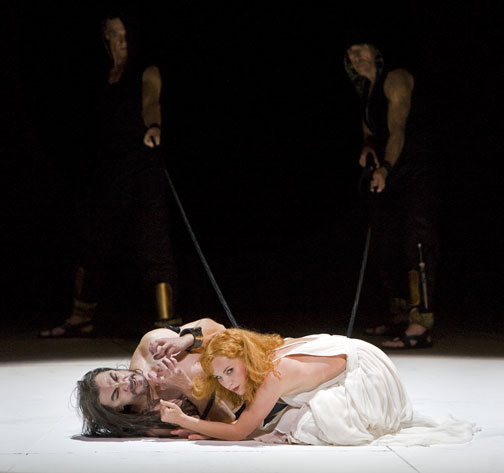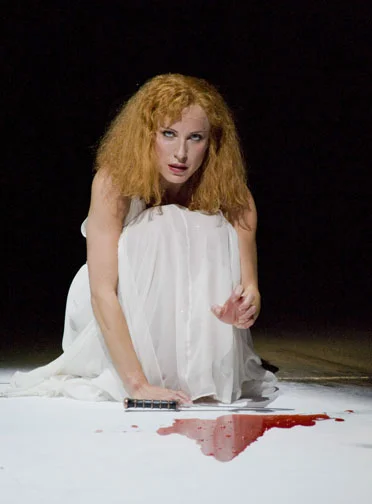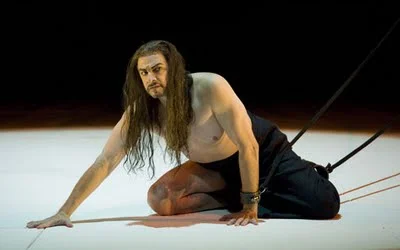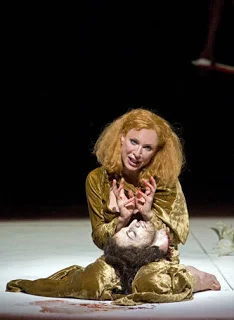Kill that woman!

The best art lingers like an aftertaste in your mouth, sometimes an unpleasant one. San Francisco Opera's current production of Richard Strauss' Salome is art on that level. It left me with a visceral feeling of having witnessed the perverse melt-down of a sexually abused and confused young girl. I can't say it was fun to watch, but it was thrilling in a weird, icky way. What this production does, especially what soprano Nadja Michael does, is bring back the ick-factor to an opera that through time and changing social mores has lost the ability to shock and pummel an audience. This Salome will leave you feeling slimed, and the only thing I can compare it to is the 1999 production of Wozzeck which I found exhilarating but had half the audience walk out before it was over.
Due to it's complexity it's probably impossible to stage a perfect version of Salome. Somewhere concessions will be made, be they musical or theatrical and this production certainly has its flaws, but the overall impact works on almost every level. Allow me to dispense with the negatives first.
SFO's Music Director Nicola Luisotti, conducting a German opera for the first time, certainly made some interesting and (I would posit often wrong-headed) musical choices. At times he slowed the tempo to a point where the singers were noticeably ahead of the music, making them sound almost physically incapable of holding back to the degree required by the conductor. At other moments Luisotti managed to expand the score to almost orgiastic beauty- words I would have never thought I would write about a Strauss work that didn't contain the words "Der" and "Rosenkavalier" in its title. Some passages were rendered with a strange fullness that was so effective I have to say for the first time Luisotti actually got me interested in what he was doing with a score. A second hearing will reveal whether this was actually a brilliant stroke on Luisotti's part or just the genius of Strauss writing for an orchestra that is ridiculously large and I'll take that second helping this Friday and let you know. It was never dull, though it often sounded weird and at times simply wrong and the cumulative effect was a potent, heady brew.
People seem to either love or loathe Nadja Michael in the notoriously difficult title role, but count me on the side of the enthusiasts. In his
Chronicle review, Joshua Kosman repeated the aphorism by the great Austrian soprano Leonie Rysanek who said: [there are] those who can sing it, those who can dance it and those who should be shot. While Michael may not sing the part to satisfy every taste (especially those dunderheads who think opera is only about the voice- hello? if that's what you think you should only attend lieder recitals and stay away from an art form that is by definition a multi-faceted mixture of music and drama) she's compelling, and more importantly, believable, in the role. Michael can sing it, she can dance it, and you understand why Herod has her killed at the end- she is just too crazed (and powerful) to be left alive. Nadja Michael's Salome is a force that will obviously destroy anything in its wake.
Greer Grimsley's Jokanaan looked and sounded the part of the religious fanatic John the Baptist. This is important because Salome's lust for the prophet is clearly spelled out in very physical terms and Grimsley embodies the descriptions, even if Luisotti's conducting left the musical side of the equation somewhere else entirely. Strauss' music for Jokanaan, featuring a slew of Wagnerian motifs, was largely ineffective and lacking in fervor, which would have only added to Grimsley's portrayal. His performance was the one most marred by Luisotti's odd tempos, but he managed to rise above it, creating a plausible focal point for the teenage girl's unbridled desire. When Herod's henchman had him attached to leashes, the overt S&M implications between the prophet and his god were laid bare for the audience to judge. Again, the ick factor was kicked into overdrive during these moments.
Kim Begley's Herod contained the right mix of pomp and pediastric perversity, though Luisotti often buried his voice in the music. His voice reminded me of the classic Gerhard Stolze recording under Solti, as did Garrett Sorenson's Narraboth. Both of these characterizations contained the lust and irrationality conveyed in the score, though Narraboth's suicide was unfortunately a dramatically uninteresting moment- one of the few missed opportunities in the staging that could have allowed the power of irrational desire to be realized onstage in its most base form. Irina Mishura and her cleavage made a definite impact as Herodias, though without the latter she may not have been as noticeable a presence onstage.
Speaking of cleavage, if anyone can prove Nadja Michael has not had breast augmentation surgery I'll buy you a drink. Fault the costumers for putting Michael in something that showed off curves nowhere to be found in the natural order of things. Also fault the costumers for putting the Jews in offensively stereotyped wardrobes of leering Hasidim when no one else onstage is called out in such blatant terms based on their religion. Yes, these kinds of things distract me, but allow me to move on to the staging.
Although Brian at Out West Arts found it be a boring, cheap box, the stage reminded me of a filthy sink that looked lifted from the set of the Texas Chainsaw Massacrere-make. Or an exploding asshole. Either way, it's a pretty horrific thing to look at for 100 minutes and combined with the evocative lighting it's an appropriate sink[shit]hole of inapropriate desire. That all of the action takes place on a moonlit circle in front of it only adds to the opressive grotesqueness of what unfolds.
So finally, permit me to return to Ms. Michael and what makes this production mandatory viewing, even if you hate it, which my companion did (labeling it among the "five worst" things she's ever seen ). In roughly 90 minutes Michael's Salome undergoes a transformation from a girl who isn't innocent by any standard (the adults around her have already stripped that away), but still possesses youth's innocent desire and curiosity to a woman having a full-blown psychotic meltdown expressed in sexual violence. Often misinterpreted as a nymphomaniac, Salome's actions reflect what she's absorbed from those around her. She's not a nympho- she's the result of being a sexual pawn and the (inappropriate) object of desire. Michael expresses this in a fearless, bold performance from start to finish. Salome's ten minutes with Jokanaan's dripping head is almost unwatchable but you can't take your eyes from her- and during this segment Michael's voice soared through the score.
When Herod can't watch/ take anymore of what he had a hand in creating and yells "Kill that woman!" in this production what follows is a mercy killing.







